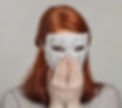Unmasking the Truth: How Masking Affects Adults with ADHD
- Valerie MacNeil M.Ed., RCC
- May 13, 2025
- 3 min read

If you’re an adult with ADHD, you might be a master at hiding it—and you may not even realize it. Many people with ADHD learn to “mask” their symptoms to fit into workplaces, relationships, or social expectations. But while masking might help you appear like everything’s fine on the outside, it often comes at a steep cost to your mental health and self-esteem.
In this post, I will unpack what masking is, how it shows up in adults with ADHD, why we do it, and how to start moving toward authenticity and self-compassion.
What Is Masking?
Masking refers to the process of consciously or unconsciously hiding parts of yourself to appear more “neurotypical.” It’s like putting on a costume or playing a role, you think the world expects—especially in professional, social, or academic settings.
For people with ADHD, masking might look like:
Forcing yourself to sit still or appear focused when your mind is racing
Over-preparing to compensate for forgetfulness or time blindness
Mimicking others’ communication styles to avoid being “too much”
Pretending to understand instructions when you're actually lost
Hiding the emotional impact of overwhelm, rejection, or burnout
Why Do Adults with ADHD Mask?
Masking often starts early. Many adults with ADHD grew up being told they were lazy, disorganized, or needed to “try harder.” Over time, we learn that showing our true selves can lead to criticism, rejection, or shame.
Common reasons for masking include:
Fear of judgment or being seen as unreliable
Desire to fit in or succeed professionally
Internalized shame from past experiences
Lack of diagnosis or understanding (especially in women and marginalized groups)
The need to constantly monitor and manage behavior can be exhausting. What looks like “functioning” to others may actually be a person running on fumes.
The Cost of Masking
While masking can help people navigate certain environments, it isn’t sustainable long-term. In fact, it can be deeply damaging to mental health.
Masking can lead to:
Chronic anxiety and burnout
Low self-esteem and identity confusion
Delayed diagnosis or misdiagnosis (especially in women, BIPOC, and LGBTQ+ adults)
Difficulty forming authentic relationships
Depression or emotional numbness
Many adults with ADHD describe feeling like they’re “performing life” rather than living it. Masking can create a disconnect between who you are and who you feel you’re allowed to be.
How to Recognize If You’re Masking
Here are some signs you might be masking your ADHD:
You often feel drained after social interactions or workdays
You carefully monitor how you talk, move, or react
You downplay your struggles, even in therapy or with close friends
You feel like a “chameleon,” adapting to others at the cost of yourself
You’re afraid people would see you differently if they “really knew”
If this sounds familiar, you’re not alone—and unmasking is possible.
Unmasking with Compassion
Unmasking isn’t about suddenly “being your true self” in every situation. It’s a gradual, courageous process of understanding your needs, owning your story, and building environments where you can thrive.
Here’s how to start:
Notice your patterns – Where do you feel most pressured to mask? What parts of yourself are you hiding?
Practice self-compassion – Remind yourself: masking was a survival strategy, not a flaw.
Find safe spaces – Whether it's therapy, an ADHD support group, or one close friend, begin practicing authenticity in places that feel emotionally safe.
Reframe your struggles – Being distracted isn’t laziness. Emotional intensity isn’t weakness. ADHD is a brain-based difference, not a moral failing.
Seek accommodations and support – Whether at work or school, honoring your needs is not “asking for special treatment”—it’s asking for equity.
You Deserve to Be Seen
You’ve likely worked incredibly hard to get where you are. But if it’s come at the cost of your sense of self, it may be time to take off the mask.
True thriving doesn’t come from blending in—it comes from showing up as the beautifully neurodivergent person you are, with strengths, needs, and a nervous system that just works differently.
You are not alone. And you don’t have to perform to be worthy. If you would like help with masking or other Adult ADHD symptoms, please click on the following link to book an appointment or free consult with me. I specialize in Adult ADHD Counselling in Victoria, BC.
Resources for Further Support:
Your Brain’s Not Broken by Tamara Rosier
Divergent Mind by Jenara Nerenberg
Podcast: ADHD ReWired
Instagram: @howtoadhd, @neurodivergent_lou
Scattered Minds by Gabor Mate
Check back soon for my Adult ADHD group coming in Fall 2025.